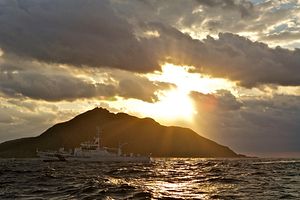A joint Japan-Taiwan committee on fisheries met for two days last week in Taipei to discuss fishing rights in disputed waters in the East China Sea, near the Senkaku/Diaoyu Islands.
According to Japan’s Kyodo news agency, the meeting resulted in an agreement to “amend current regulations” concerning fishing in the disputed waters around the islets. The regulations will be implemented beginning in April.
The two sides had concluded a bilateral fisheries agreement in April 2013 to govern reciprocal fishing rights across their disputed exclusive economic zone in the East China Sea.
According to the Taiwanese Ministry of Foreign Affairs of the Republic of China, the modified regulations will apply to one of the designated zones as per the Japan-Taiwan fisheries agreement, which covers waters around the disputed islets.
The zone in question is the so-called inverted triangle region between the Senkaku/Diaoyu Islands, the Yaeyama Islands at the southern reach of the Ryukyu island chain, which include Yonaguni Island, and Taiwanese waters. Per the bilateral fisheries pact, each government regulates its fishermen in the area.
Japan administers the islands, which are claimed by both the governments of Taiwan and China. While China regularly sends maritime law enforcement vessels near the islands to administer it claims, the dispute between Taiwan and Japan has also flared up from time to time.
Last year, for example, the Taiwanese government protested that it had the right to conduct oceanographic research within the disputed waters with Japan.
“While the two sides hold different positions on the demarcation of the EEZs, the Republic of China government has insisted consistently that its research vessels have the right to engage in oceanographic research within its EEZ,” the Taiwanese foreign ministry declared last year.
In 2015, the two sides reached a landmark amendment to East China Sea fishing regulations to expand the time available to fishermen in the inverted triangle area.
The agreement also increased the required distance between fishing vessels in the area to prevent collisions and conflicts over access to fish stock.
Taiwan and Japan do not have formal diplomatic relations, but their working-level relations are managed by government-supported associations in each country.
Despite their agreement on regulating fisheries in the East China Sea, the two sides have an outstanding dispute over the demarcation of their respective exclusive economic zones.
































